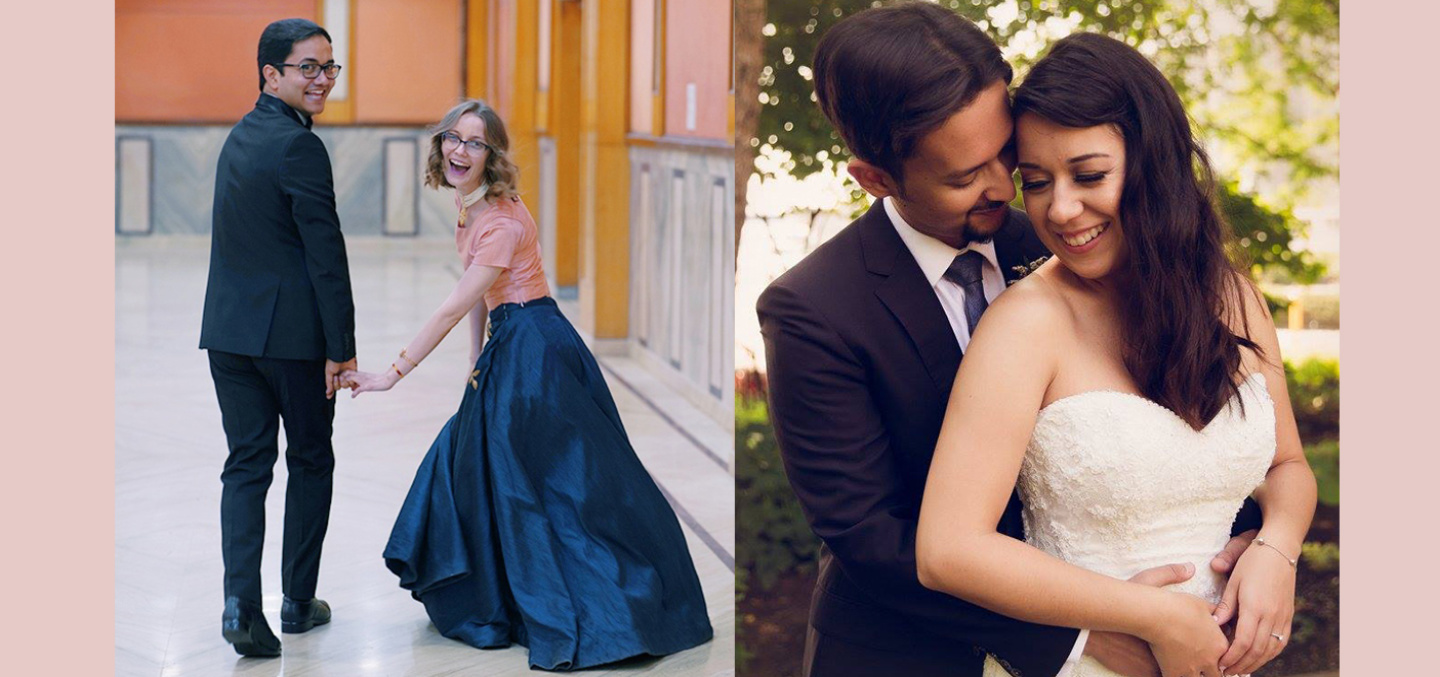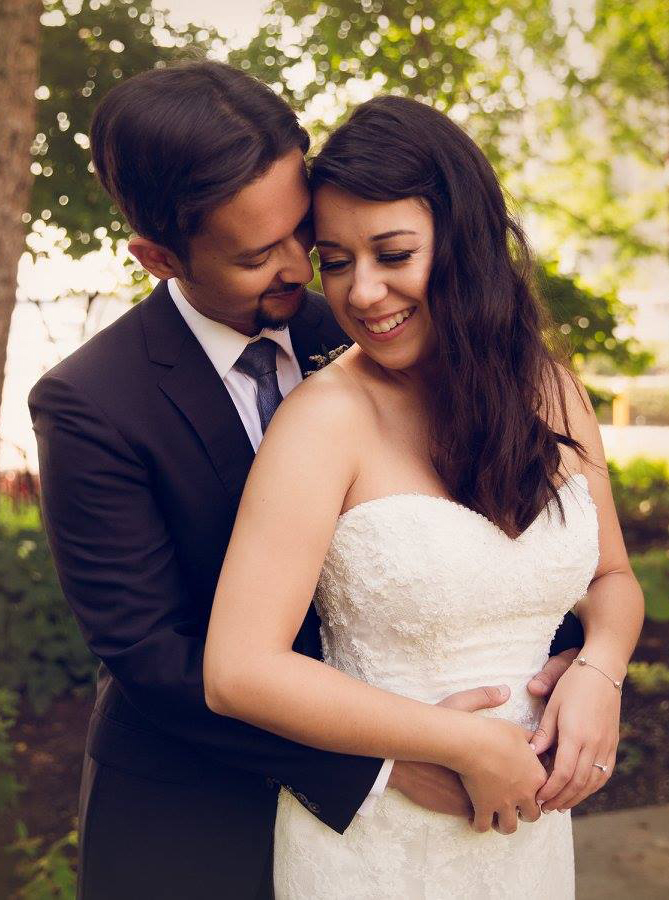
Married to a foreigner: 3 interracial couples on life, love and dal-chawal
Improving international relations
Cutting into a gulaab jamun and getting married have a lot more in common than what meets the eye. At first glance, all you see is a beautiful ball of calorie-filled goodness. What you don’t account for however, are the concealed kaju-pistas (read wet towels strewn on the bed, interfering in-laws and the infamous toilet seat debate). The challenges get even more colourful when you’re one of the interracial couples trying to have a navigate a marriage across diverse cultural backgrounds.
We spoke to three couples who shared with us the lifelong adventure that is being married to someone from an ethnic and cultural background completely different from theirs, and they gave us a crash course in what to expect when you find yourself in a similar situation.
Anastassiya Savchenko (Ana) and Sudhir Sharma, Jaipur
The day they met was a day of many firsts for Ana. It was her first time at the disco, it also turned out to be the first time she would give her phone number to a complete stranger – Sudhir, who is Indian but was studying to be a doctor in Kazakhstan. “I was slightly sceptical because he was a foreigner, but he was pursuing me very scrupulously and it seemed serious so I bent my rules,” says Ana.
This unexpected run-in quickly transformed into a whirlwind of a romance complete with a dramatic breakup, and reconciliation facilitated by a heartfelt love letter delivered to Ana’s hostel’s doorstep. But just when everything seemed rosy and picture perfect, Sudhir had to rush back to India for a family emergency.
A smitten Ana followed – “ When I look back now, I can’t fathom how I was so brave. I used all
my savings to buy the tickets and gifts for his entire family, and just showed up in Jaipur with no money.”

Prepare for a lifetime of accidental goof-ups
“Sudhir was supposed to come fetch me the day I landed in Jaipur, but as it turns out, he was running late. I thought he wasn’t going to show up at all and my backup plan was to sell all the gifts I got for his family and then use the money to fly back home.
But to my relief he did show up and also got me flowers—the funny thing was that he had got me an even number of flowers. Back home, you only give even number of flowers during a funeral, so that was hilarious, and is something we laugh about even today.”
Adapt but don’t lose yourself
Following customs and fitting into the family are the most common challenges interracial couples face. But Ana emphasises on how important it is to not lose your sense of self. “Sudhir’s traditional Marwari parents weren’t too pleased with us getting married. This made me want to fit in even more. I was covering my head, wearing bindis and sindoor, and even mopping the floor. But one day I realised I was losing myself — I had studied very hard at my university and went on to work at one of the biggest advertising firms, I didn’t do all of that to end up washing floors. So, that was the day I put the pocha and my foot down,” recalls Ana, who went on to launch her own media platform.
“Sudhir backed me the entire time, even when I refused to follow certain traditions and customs like fasting or eating only after your husband had finished eating. He, in fact, put his medical practice on hold to help me build my business,” she adds
Meet each other half way
“I would live from New Year to New Year and now I live from one Diwali to the next,” laughs Ana, explaining how in Kazakhstan, New Year celebrations are seven-day-long affairs.
The couple’s interracial marriage has also transformed their menus. “In our house now, chillies are used just to decorate the kitchen shelf. I also seem to love the things I would earlier have referred to as ‘sick people food’,” says an amused Sudhir.
Kate Chaillat and Samrat Mukherjee, Mumbai
Kate, who is French, came to India 12 years ago to work as an intern in a magazine where she met Samrat. They became friends, but when the internship ended, they parted ways. Until a few years later, when they reunited at a friend’s wedding. As in every Bollywood rom-com, they walked away from that wedding with more than just bad hangovers and food babies. They eventually got married and today, are parents to a beautiful girl.
Sometimes, objectivity is imperative
Being in an interracial marriage is like being on Takeshi’s Castle – the hurdles and decision making never stop, and more often than not, the wrong decision lands you in a pile of muck. So the best way is to take a step back and look at the situation objectively. Sometimes, that might mean one person sacrificing more than the other. “I always liked India and already felt connected to the place. Also, I am from France and he doesn’t know a word of French. So me moving to India made more sense,” explained Kate.
Food is a real challenge
Moving bases comes with more than jet lag and changing time zones. The nuances of how an alien society functions on a day-to-day basis might come as a shock too. “In the beginning, I would take the lack of punctuality personally, but now I too have adapted to ‘Indian Standard Time’,” says Kate. Food was another struggle. “The first six months, I felt hungry all the time because I wouldn’t eat enough. The vegetables are different, as is the the way they’re cooked, I was just missing French food. I couldn’t keep eating dal and rice,” she says. “But life has come full circle because our daughter loves dal chawal—it’s her comfort food,” laughs Kate.
Over time, Kate and Samrat have concocted recipes of their own, which are reminiscent of French cuisine but have Indian undertones. Ratatouille made with haldi and cumin is one such fusion favourite.
Learn to say no to unsolicited advice about parenting
“It’s important to not feel pressured into doing things you are not comfortable doing,” advises Kate. The mother and father should have the final say in how the baby should be raised, even if it means rubbing a few people the wrong way. “I didn’t put kajal on my daughter or pierce her ears because that didn’t make sense to me. However, there are things we do that are very Indian. For example, people in France only give children pureed food, but I’ve realised that dal chawal works really well when the child is teething.”
Ayan Mukherjee and Ruth Godoy, Toronto
Ayan was born in Ahmedabad, lived in Mumbai for about a decade, moved to Kuwait, studied in Tamil Nadu, briefly lived in Bengaluru, and finally found himself in Toronto working as a psychotherapist. Ruth is part Venezuelan and part Spanish, and moved to Canada for college where she’s lived ever since.
They met on an online dating platform, married, and are now expecting their first child.

Find common ground and build from there
“We both have a very similar value system. Our thoughts on relationships, money, career and our responsibilities are very similar. That forms the backdrop of our relationship and also helps make differences manageable. Even if I was marrying someone who was Indian, but had completely different values, it wouldn’t work out,” says Ayan. Being in a relationship with someone whose approach to life is similar to yours is more important than where you were born or what language you speak.
An interracial marriage is the reality check you’ve been waiting for
Sometimes, customs and traditions turn out to be prejudices in disguise. Ayan admits his marriage helped him become more self-aware. “I grew up in a typical Indian household – my dad would go to work and my mom was a housewife. Unintentionally, I expected Ruth to fulfil the duties I had watched my mother do while I was growing up. I expected dinner to be ready when I was back, especially if she was working from home. Only when she questioned this did I notice this programming,” reveals Ayan.
Dividing the workload is the best way to approach cross-cultural parenting
It is important to take equal responsibility if you want your children to make the most of their parents’ diverse cultural backgrounds.
“Ruth has taken it upon herself to acquaint our future baby with her culture while I’ve decided to outsource my bit – I have family in Toronto, so my uncle and aunt are going to teach the baby Bengali and everything else that comes with it. The only hiccup is that I don’t understand a word of Spanish so I’m a little afraid of feeling left out when the child and Ruth speak with each other,” says Ayan.

